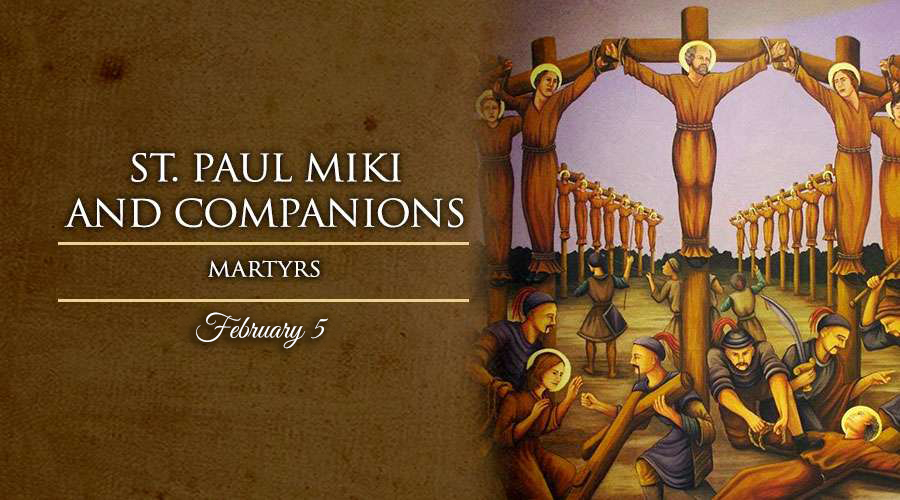
About the Commemoration
Christianity was brought to Japan by Francis Xavier (see December 3), and the faith spread with remarkable success. The rapid advance, however, led to resentment and opposition on the part of the native Buddhists and Shintoists. There was suspicion of the methods of the missionaries, which involved mass conversions, and there was rivalry between the several religious orders. These suspicions, coupled with a fear of foreign invaders, resulted in increased persecution of Christians. On February 5,1597, twenty-six Christians—six European Franciscan missionaries, three Japanese Jesuits, and seventeen Japanese laymen, three of whom were young boys—were killed by a kind of crucifixion at Nagasaki. They were raised on crosses and then stabbed with spears. (The Franciscans may have been singled out for persecution because of the careless remarks of a Spanish captain, wrecked off the Japanese coast, that led the Japanese to believe that the increasingly active Franciscans, based in the Spanish-held Philippines, were preparing the way for the conquest of Japan by Spain.) Within a year, more than 130 churche: were burned. After a time the persecution subsided, but in 1613 it broke out again and by 1630 what was left of Christianity in Japan had been driven underground. Nonetheless, the faith was preserved, although the church in Japan was without clergy until the missionaries returned at the end of the nineteenth century.
The first victims of the persecution, the twenty-six martyrs of 1597, were canonized by the Roman Catholic Church in 1862. Paul Miki, a Japanese Jesuit priest, is the most celebrated of the martyrs. The Franciscan missionaries were led by a Spanish priest, Peter Baptist. One of the laymen was a Korean, Leo Karasuma.
The Nippon Sei Ko Kai (the Holy Catholic Church of Japan), which is affiliated with the Anglican Communion, adopted this commemoration on its calendar of 1959 as an inclusive festival of all those who have given their lives for the Christian faith in Japan. The 1979 American Book of Common Prayer, the Lutheran Book of Worship, Evangelical Lutheran Worship, and the Christian Year include the observance.
Excerpts from New Book of Festivals & Commemorations: A Proposed Common Calendar of Saints by Philip H. Pfatteicher, copyright, 2008 by Fortress Press, an imprint of Augsburg Fortress.
See also: Paulo Miki; 26 Martyrs of Japan
Reading
From The Imitation of Christ by Thomas à Kempis
Be assured of this, that you must live a dying life. And the more completely one dies to self, the more one begins to live for God. No one is fit to understand heavenly things unless he is resigned to bear hardships for Christ’s sake. Nothing is more acceptable to God, and nothing more salutary to yourself, than to suffer gladly for Christ’s sake. And if it lies in your choice, you should choose rather to suffer hardships for Christ’s sake, than to be refreshed by many consolations; for thus you will more closely resemble Christ and all His Saints. For our merit and spiritual progress does not consist in enjoying such sweetness and consolation, but rather in the bearing of great burdens and troubles.
Had there been a better way, more profitable to the salvation of mankind than suffering, then Christ would have revealed it in His word and life. But He clearly urges both His own disciples and all who wish to follow Him to carry the cross, saying, “If any wall come after me, let him deny himself, and take up his cross and follow Me.” Therefore, when we have read and studied all things, let this be our final resolve: “that through much tribulation we must enter the Kingdom of God” (Acts 14:22).
Thomas a Kempis, The Imitation of Christ, trans. Leo Sherley-Price (Baltimore: Penguin, 1952), 68-69, 88-89, 83, 206-206, 72. Introduction and Translation copyright 1952 by Leo Sherley-Price. Reprinted by permission of Penguin Books Ltd.
Propers
God our Father, source of strength to all your saints, you brought the holy martyrs of Japan through the suffering of the cross to the joys of eternal life: Grant that we, encouraged by their example, may hold fast the faith we profess, even to death itself, through Jesus Christ our Lord, who lives and reigns with you and the Holy Spirit, one God now and forever.
Leonine, rev. 1970 Roman Missal, trans. LFF
Readings: Ezekiel 20:40-42; Psalm 116:1-8 or 16:5-11; Galatians 2:19-20; Matthew 28:16-20 (RC) or Mark 8:34-38 (LFF)
Hymn of the Day: “Hearken to the anthem glorious” (H82 240,241) or “Have no fear, little flock” (LBW 476, LSB 735, ELW 764)
Prayers: For the church in Japan; For boldness to confess Christ; For the spirit of Christ to forgive our enemies.
Preface: Holy Week (BCP)
Color: Red
Also on February 3
The Lutheran Service Book on the date commemorates the patriarch Jacob (Israel).
